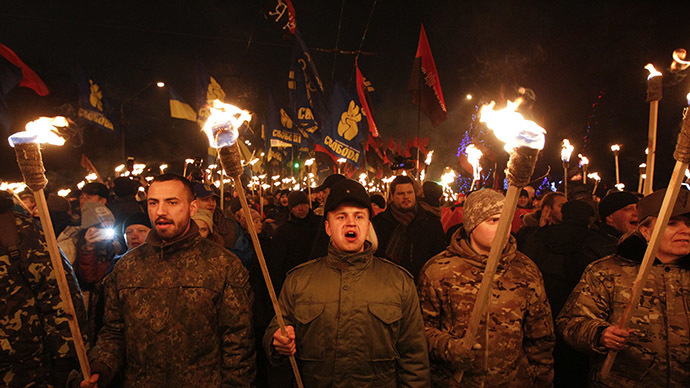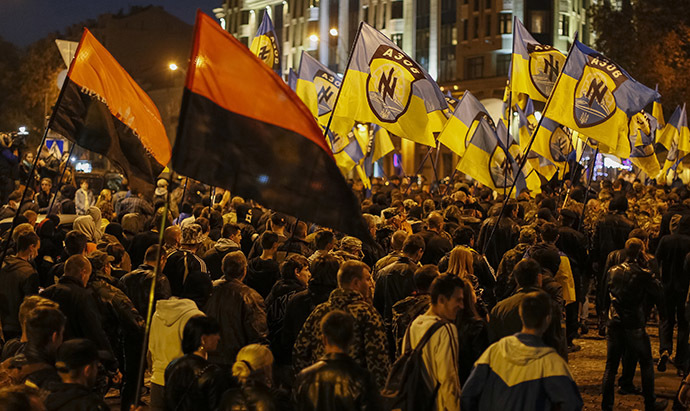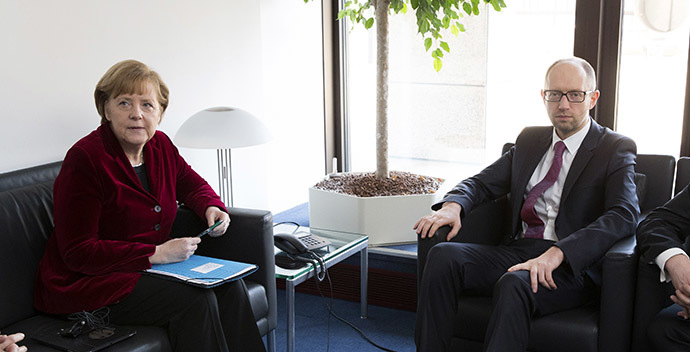Berlin got embarrassed by Ukraine PM’s ‘whitewashing Nazi Germany’

The Ukrainian PM clarified claims that the USSR invaded Germany and Ukraine during WWII because Berlin pressured the leader to do so, political analyst Aleksandar Pavic said. Berlin was put in an awkward position after its ally whitewashed Nazi Germany.
While on an official visit to Germany, Anseniy Yatsenyuk stated on national television that it was the USSR that invaded Germany. While officially Berlin kept silent and refused to comment, Yatsenyuk’s office insisted he didn't quite mean what he said.
READ MORE: ‘Soviets invading Germany, Ukraine:’ Berlin faces tough choice on PM Yatsenyuk’s WW2 take
RT:Yatsenyuk has now expanded on his initial comments, saying that he meant the post-war occupation. Was the initial comment a slip of the tongue?
Aleksandar Pavic: Well I would say maybe a Freudian slip, because this is kind of really impossible to believe, to have somebody get this thing wrong. I mean, it is in all the history books. It has been since WWII. It is basically known who attacked who. It is basically known who Nazi Germany was, who Hitler was. So for someone to say the opposite...I think it is something that they may have had in the back of their mind that just kind of slipped out the wrong way.

RT:Why do you think Berlin at the time did not put the record straight? Were they just being diplomatic?
AP: Well yes! You see, Germany is in a very awkward position, because Yatsenyuk is their ally. More than that, he is a project of the West, not just of Germany of course. And it is kind of embarrassing, now you have Yatsenyuk pretty much whitewashing Nazi Germany. And it is not a very well-kept secret anymore that in the past year since Yatsenyuk and company have been in power in Ukraine, you had a real resurgence of neo-Nazism in Ukraine. You had renewed memories of figures like Stepan Bandera who collaborated with the Nazis during WWII. So it’s quite embarrassing for Germany. I think they just thought that “if we don't talk about it, then maybe fewer people will notice it.”
RT:This confusion came when Yatsenyuk was on an official visit to Berlin. Do you think it had any effect on the talks between he and Merkel?
AP: It surely must have, because I don't think Angela Merkel was very happy with what Yatsenuk had to say. And I think you could see that, because the next day he went back on his comments, supposedly clarifying it. I’m sure that was the result of discussions he had with his German hosts, because this is kind of an awkward statement to make. And I think German public opinion does not stand for that kind of a revisionist stance of WWII.

RT:Merkel didn’t react to this gaffe; however, she reiterated that sanctions on Russia will only be lifted when, as she put it, the Minsk peace plan is fully applied. Why don’t we see similar pressure from Berlin on Kiev? Do you think this has happened behind closed doors? It did not happened publicly.
PA: No. But you see, this is not a new tactic. Ever since the 90s, we had former Yugoslavia, we had Iraq, we had Syria – all these declared enemies of various Western states. They are always put in a position where they have to produce something over which they have no control, or don’t have full control.
It is a very perfidious sort of a game. So you put pressure on somebody to do something, even though they can't really control the process. So they are doing the same thing to Russia right now, as you've said. Russia can’t control what Ukraine does. And so Russia can be totally following the letter and the law of the Minsk agreement, but you have violations on the Ukrainian side, so sanctions on Russia continue. As I said, it is not a new methodology.
The statements, views and opinions expressed in this column are solely those of the author and do not necessarily represent those of RT.












